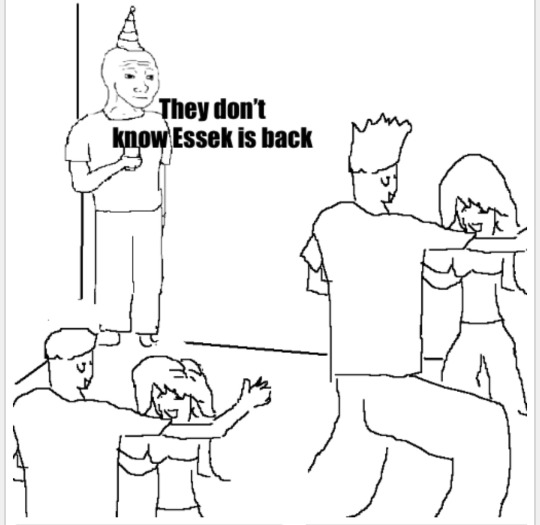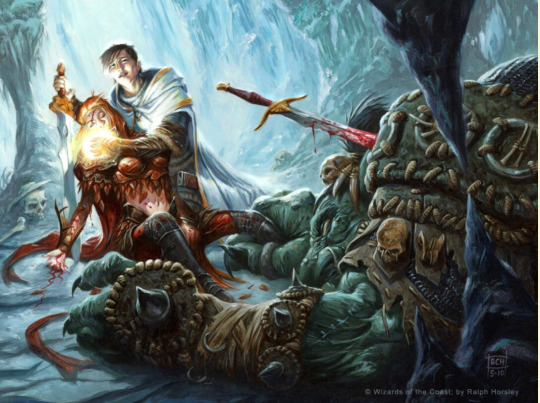#it’s giving ‘something happened that devastated your group so I’m giving you a beloved npc from a previous campaign as a treat’
Explore tagged Tumblr posts
Text

Me this whole week
#IS IT THURSDAY YET#cr spoilers#essek thelyss#ok this is my last one I’m going to bed#Matthew Mercer man that you are#it’s giving ‘something happened that devastated your group so I’m giving you a beloved npc from a previous campaign as a treat’#like with allura in c2#anyway I can’t wait to read more meta goodnight#shouting into the void that is this little blog#can anybody hear me?#I love this game#critical role made me feel shrimp emotions#critical role
136 notes
·
View notes
Text
Make It Mean Something - Making PC deaths meaningful to the other players

Hullo, Gentle Readers. Sometimes the dice are not in a player’s favor. Sometimes three death saves come up awfully fast. Sometimes a death happens, and everyone’s sitting around the table uncertainly, not sure how to react. It is that moment that daddydeputy raised in their Question from a Denizen. They asked if I had any thoughts on “How to make pc deaths more impactful and growthful for the others (and perhaps themselves?)”
DD, it’s a tricky balance to strike. On the one hand, you want the game to have real and dangerous consequences for the actions the characters take. On the other hand, the death of a beloved character can really upset a player or even crash a whole campaign. My players are very mature and accepting of the consequences (although they’ll pull out all the stops to try and stop it from happening to one of their own), but not everyone can be, even if they say they are. Sometimes you don’t know how the death of a character is going to affect you until it happens. I think of myself as a very mature player, but if a character as dear to me as Skittle, my mouse pooka from Changeling the Dreaming, died, I suspect I’d be devastated.
Some campaigns have a very revolving door attitude towards death. Oh, you died? Here’s a revivify spell, or a raise dead spell, or what have you. Other make it harder, possibly keeping those spells out of the hands of the players or requiring skill challenges for raising the dead (a la Critical Role). I suspect DD is wanting to lean more towards the latter, so let’s look at some ways to really make death matter.
Run lower-level campaigns: At low levels, death is a lot more difficult to overcome. By the time you get your fallen friend to a temple, the window for Revivify is long over, and who can afford the diamond for a Raise Dead spell, even assuming you can find a cleric who can cast it for free for you? But most NPC temples I’ve run in my games have been willing to cast Raise Dead for free if the PCs will undertake a quest on behalf of the temple. In a situation like this, the dead PC’s player could potentially play a cleric or paladin of the temple sent along to help, or the temple might cast raise dead in advance and take an oath that they will fulfill the quest. If the temple doesn’t trust them to keep their word, there are always geas spells to make sure of it.
Limit access to spells that return the dead: Maybe not every god grants the ability to raise the dead to their followers. Maybe diamonds are hard to find in your campaign. Whatever the path you take, you can make certain that death isn’t just a revolving door by making the spells difficult to cast. Maybe the deity will only grant the spells to their cleric once the party fulfills a quest or defeats a monster that has been plaguing the faithful. You could change the material component from a diamond to “the deity’s favor.” Casting the spell expends the favor, so now a new service to the deity would be needed before the next chance of casting it.
Make return from death uncertain: One of the things I really like in Critical Role that I intend to adopt in my next campaign (and I even know how I’m going to make the change make sense in my campaign world) is that returning from death via Raise Dead is by no means a certain thing. The Critical Role has a skill challenge like system in which up to three people can contribute to the ritual to return the dead by entreating the dead person to return. If people all want to use the same skill, such as Persuasion, the DC for the second and third people goes up. A PC might be coaxed to return via Performance, Persuasion, Intimidation, Deception...I’d even allow rolls like Arcana for magically coercing the dead spirit to return or Religion to remind a Paladin that their duty to their deity is not yet fulfilled. This had led to some dramatic moments in CR, and I definitely intend to put together my own system for my next campaign.
Make return from death limited: You could very easily put together a system that limited the number of times the same spirit could return from the dead. In older editions of D&D, returning from death required a “System Shock” check, and the body might not survive the attempt to reunite it with its spirit. If you wanted something similar, you could make a system in which one of your attributes represents your ability to return from death, even using Revivify. I would like base it off of your Constitution or Charisma score. You can return from death a number of times equal to 1+your Constitution or Charisma modifier (minimum of 1). That way, characters can die at least once and come back, but it can’t happen dozens of times.
Make the way someone dies directly affect their afterlife: For some players, this will really matter. I once had a ranger who despised dragons in a campaign. He found a dragonslaying sword, made it his business to get the party to face dragons, etc. When he finally died, it was facing two dragons to buy the party time to escape from a canyon where the dragons were in danger of TPKing them. He was killed, but he wounded both dragons quite a bit. The party managed to kill them, and they recovered the body. The ranger’s player absolutely had no intention of coming back from the dead. “How on earth would my character have a cooler death than that?” the player laughed. “That was perfect.” I described how he was received into the afterlife of his culture as a hero, and he was very happy with the end of the story for his ranger. To draw this along further, what if how a PC dies affects their standing in the afterlife? If they die in a super cool way, maybe they get a high place of honor in Valhalla, or whatever you use. A PC who then dies fighting a lich or saving innocents is likely to receive a heroes welcome. This might be preferable to them than going back to life and then possibly getting killed by a trap or a bunch of orcs. This then makes the heroic death more palatable and desirable.
However you decide to make death impactful, I strongly recommend letting story trump rules for dramatic purposes. Technically, a character who has failed three death saving throws is just plain dead, but what fun is that. Instead, consider the possibility of having them be beyond saving instead. Let them be briefly conscious, either to beg the others to find a way to save them (think Spider-Man in Avengers: Infinity War as he gets “dusted”) or to tell them that their death is welcome and to let them go (a la Theoden in Return of the King). I remember a Werewolf game where a beloved PC was dying and telling her beloved pack how much she cared for them. There were many real tears being shed around the table, including by me as the Storyteller. Giving the PC a chance to speak and interact, even though it’s not part of the rules, gave the group a moment that I know I personally will never forget.
The biggest piece of advice I can give is that you must make sure your players are onboard with this. If you want death to be more powerful, impactful, and difficult to return from, DO NOT spring this on your players mid-game. This should be something everyone’s aware of, not something that comes as a surprise. Let everyone know during Session Zero; make sure everyone is okay with it, and, if not, be prepared to either back off from the idea (or else find a different player who’s onboard.) Like the X-card, be prepared to modify this even mid-campaign if someone shows that maybe they’re not as okay with losing Damathran Darkwarden as they thought they were. In the end, it’s just a game. It’s not worth hurting feelings and losing friends over.
I hope that helps, DD. Thanks for the question!
207 notes
·
View notes